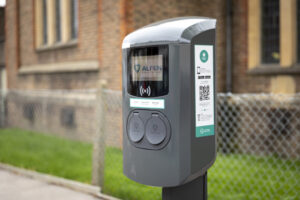We must all take responsibility for cleaner air
There is no easy way to fix the UK’s air quality crisis, say Lesley Vining and Matt Davies, but should we, as citizens, bear some of the responsibility?
The UK government has faced an ultimatum to show how it plans to comply with EU air quality regulations.
The main issue is road traffic. Central and local government have long been encouraging us out of cars. From major capital investments, such as trams, guided bus ways, improvements in public transport fleets (more efficient engines, exhaust controls and hybrids), city planning and traffic management.
London has created a low emission zone and a number of our other cities are set to follow suit either with a blanket ban or by restricting certain vehicles. Other measures are being implemented: removing parking, imposing speed restrictions, creating new pedestrian areas and routes, cycle schemes, green travel plans.
The government’s air quality plan, published in July 2017, placed emphasis on local authorities to implement measures at a local level. But many city leaders felt that the plan, which includes a ban on petrol and diesel cars and vans by 2040, lacked urgency, ambition and specific actions. The EU directive requires the air quality limits to be met in the shortest possible time.
We must take responsibility ourselves; change our own behaviour and priorities
The options to improve air quality are costly and generally not popular with either the public or local businesses. Taking all but the newest vehicles off the road would require 25% of the UK fleet to be scrapped at a cost of £6bn, and creating clean air zones (CAZ) would cost over £1bn. CAZs where certain vehicles are charged to enter an area would hit business and local communities.
We are moving in the right direction, however. The government predicts levels of compliance doubling in three years, with full compliance achieved in 2026. The next batch of local authority plans to tackle local air pollution are due at the end of this month with the final deadline at the end of this year.
As well as introducing CAZs, local authorities are investing in improvements to infrastructure to encourage walking and cycling, education authorities are promoting walking buses and walk-to-school campaigns, and employers are adopting green travel plans to encourage car sharing, public transport and cycling.
Our attachment to cars is not going away, and recognising this, the growth of ULEVs, and electric vehicles in particular, is a major part of the government’s ambitions to decarbonise road transport. To make this work, there remains much to be done to improve charging infrastructure around the country and bring down vehicle cost but there is a clear trend.
New technologies and initiatives are important, however we must take responsibility ourselves; change our own behaviour and priorities. Yes, many parts of the country require independent means of travel where no viable alternatives to cars exist, but in our urban areas options are present.
So, before we protest too much that more must be done by central and local government, let’s consider what we can do ourselves, and support those taking action in our local communities to reduce congestion. It will take energy and commitment, but will offer clear rewards.
- Lesley Vining is UK air quality lead and Matt Davies is managing principal, at Ramboll’s environment and health division. This article reflects the personal views of the authors.
Photo by David Holt London 















